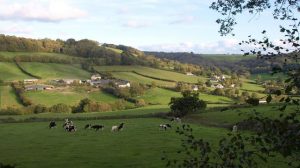Remote work opens the door to rebuilding ageing, shrinking towns, not through the creation of new jobs, but by the relocation of those who can work anywhere
.
There are real pressures on and fears for the rural economy:
Rural communities and the coronavirus
Re-starting the economy in rural areas
And a real issue for some time has been lack of access to good broadband:
Broadband after the coronavirus

That might be changing.
With the realisation that many can now work from home – why not relocate to a nice part of the country?
Decentralization and technology-enabled home working
This might have a really positive effect on rural economies – bringing in professionals to tired country towns and villages.
There have been several pieces in the press of late on this subject: here are sections from two recent Financial Times comments:
.
Is now the right time to move to the country?
In the UK, potential buyers are definitely pining for the countryside. Online searches for homes in rural and coastal locations have increased since the country went into lockdown 10 weeks ago. In the first week of May, the number of searches for homes in rural locations on Zoopla was up 68 per cent compared with the first week of March.
Searches for homes close to the quaint coastal town of Dartmouth in Devon increased 126 per cent…
In the UK, Andrew Perratt, head of Savills country homes, is not expecting a large-scale exodus from cities. But people wealthy enough to own two homes are changing their priorities, spurred by the assumption that they will be spending fewer days in the office.
“The trend has been for people to have their main base in the city and a holiday home in the country,” he says. “Now that’s slipping, and people are saying: ‘Let’s keep a bolt-hole in the city but move our principal residence to the country.’”
While a move to the country may mean more space and cleaner air, there are drawbacks. In the UK, some rural areas lag towns and cities for broadband and mobile coverage, according to an Ofcom report in December — though, since March, all homes have been legally entitled to request adequate broadband under the Universal Service Obligation.
Is now the right time to move to the country? | ft.com
.
Let’s turn our rural fantasies into reality
Whenever the going gets tough, I ignite a lively internal fantasy about leaving it all behind for a quiet life in the country. It is never raining in my fantasy, and never cold. It is always either dawn or dusk. I never have shoes on. Nor do I appear to have a job.
I am not alone in my dreaming. Zillow, the US real estate website, has reported a rise in the number of searches for homes in rural geographies since lockdown began. Searches in suburbs were down. Why pay to live within commuting distance when you can tear up your rail pass and commute to the barn instead?
Sitting in my office that is actually my bedroom, I dream about flora and fauna beyond the ginger cat in my neighbours’ window and 15 bean plants I am rearing in yoghurt pots. They were the only seeds left in the garden shop on the eve of lockdown.
I love London. But the real reason I live in Zone 2 is proximity to the same non-essential office job that the coronavirus pandemic has revealed I do not actually have to be in, or even near, a city to do. Workers move to cities for opportunity, culture, the endless diversions — the justification gymnastics that explain why we pay extortionate rents for shoeboxes in neighbourhoods where they serve extortionately priced drinks. But as the world navigates a tragic global health crisis, a funereal quiet has stripped many cities of their specific magic. It is unclear, in a post-pandemic world, when or if it will return.
Under pressure of a sudden lockdown, remote working has accelerated like burnt magnesium. Working from home is no longer a privilege, nor the provenance of people we secretly envied but shunned as enlightened under-achievers. It is our normal.
No wonder the bucolic fantasy is spreading. If work from the kitchen table is likely to persist, why shouldn’t that table look over rolling fields?
True country life has been untenable for a generation, as rapid globalisation destroyed rural economies. Remote work has finally made my fantasy into a possibility. It opens the door to rebuilding ageing, shrinking towns, not through the creation of new jobs, but by the relocation of those who can work anywhere and are into absurdly inexpensive homes…